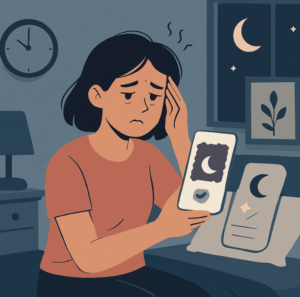🌙 Are You Really Sleeping Well? Try This Simple Sleep Quality Screener Today!
 Sleep is not just “rest.” It’s when your body heals, your brain processes emotions, and your energy gets recharged. Yet, millions wake up every morning feeling more tired than the night before. If you find yourself groggy, irritable, or unable to focus—it might be more than “just a bad night’s sleep.” It could be poor sleep quality.
Sleep is not just “rest.” It’s when your body heals, your brain processes emotions, and your energy gets recharged. Yet, millions wake up every morning feeling more tired than the night before. If you find yourself groggy, irritable, or unable to focus—it might be more than “just a bad night’s sleep.” It could be poor sleep quality.
But how do you measure sleep quality?
✅ Try Our Free Sleep Quality Screener
We’re sharing a quick and easy Sleep Quality Screener adapted from the well-known Sleep Quality Scale. This tool helps assess how your sleep has been over the past one month. It covers various aspects like:
-
Falling asleep
-
Staying asleep
-
How refreshed you feel after sleep
-
Daytime consequences like fatigue, forgetfulness, and mood changes
Each question is rated from 1 (Rarely) to 5 (Almost Always), with a helpful key:
-
Rarely – None or 1–3 times a month
-
Sometimes – 1–2 times a week
-
Often – 3–5 times a week
-
Almost Always – 6–7 times a week
📋 What’s in the Screener?
Here’s a sample of what you’ll reflect on:
-
😴 “I have difficulty falling asleep.”
-
💤 “I feel refreshed after sleep.”
-
😠 “Poor sleep makes me feel irritated.”
-
🧠 “Poor sleep makes it hard for me to think.”
-
🛏️ “I have difficulty getting out of bed.”
-
😢 “Poor sleep makes my life painful.”
There are 28 items in total, giving you a holistic view of how your sleep is affecting your mental, emotional, and physical health.
🧠 Why Sleep Matters
Poor sleep quality has been linked to:
-
Depression and anxiety
-
Weakened immunity
-
Increased risk of lifestyle diseases (like diabetes and hypertension)
-
Impaired work performance and memory problems
-
Relationship stress and reduced quality of life
Sleep is as essential as nutrition and exercise for healthy living.
📈 What to Do If Your Sleep Score Is Poor
If you find yourself frequently answering 4s or 5s (“Almost Always”) to questions about difficulty sleeping or daytime tiredness, it’s time to:
-
Review your sleep habits
-
Rule out underlying medical conditions (like sleep apnea or depression)
-
Consult a doctor or mental health professional
-
Begin behavioral strategies like CBT for insomnia (CBT-I) or sleep hygiene routines
🕵️♂️ Want to Know How You Score?
Take the Sleep Quality Screener today.
You deserve restful, healing sleep—not just “hours in bed.”
Dr. Srinivas Rajkumar T
Consultant Psychiatrist
Apollo Clinics Velachery & Tambaram
🌐 srinivasaiims.com
📱 +91 8595155808